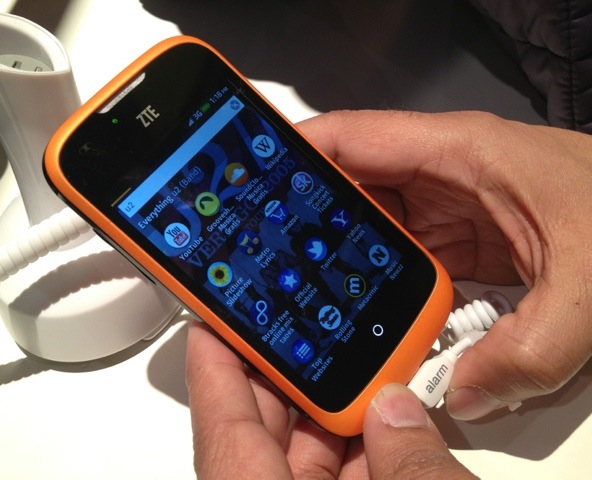“That’s probably our most frequently asked question”, said the Mozilla rep at the Firefox booth when I asked him why as an Android user I might prefer FirefoxOS.
For those who haven’t been keeping tabs on it, Mozilla is launching a new mobile device operating system in Q2. Although based on Linux like Android, FirefoxOS is stripped of much of the rest of the layers Google adds to Linux and is meant to be even more “open.”
It’s slated to ship in Q2 of this year in Eastern Europe and Latin America. It is free to carriers and runs on relatively cheap low-energy hardware. The demo unit I saw was by ascendant Chinese manufacturer ZTE. Mozilla itself is a not-for-profit organization – their only source of revenue for FirefoxOS is apparently small payments they will collect from Bing, Google and Yahoo for referring search traffic. The topic for their MWC keynote is “Connecting the next 2 billion”. So it would seem as though the primary technology it’s meant to replace isn’t Android or iPhone per se, but feature phones.
Apps on FirefoxOS are all based on HTML5, so essentially everything is a web app. They thus like to say that the platform can support “8 million apps”, referring to their estimate of there being roughly 8 million websites. From the home screen you can swipe over to a pane called “Dynamic App Search”. In the demo I saw, you can type in “U2” and it pulls up “apps” like YouTube and Soundcloud. By tapping an app from this screen, you can “sample” it, basically using a simplified version – effectively a mobile-optimized website. If you long-press on it, you can add it to your home screen and then use a richer full version of the HTML5 web app.
There’s a Firefox marketplace to help with app discovery, and Mozilla validates apps to ensure they are not malware. If cleared, these apps are given lower level access to the core phone APIs (camera, storage etc.)
But you (or a brand) can also make their own app market, invoking your own standards for apps and your own pricing structure and billing setup. It’s just like on the web, where different websites offer a variety of shopping and purchase experiences.
So FirefoxOS is indeed fundamentally different from Android (and iOS for that matter). It is more open and flexible, and is likely not onerous to code for since it is built deliberately around the HTML5 standard. I came away feeling like there very well could be a role for it in the larger mobile ecosystem, particularly in developing markets that are stepping up from widespread feature phone usage.


